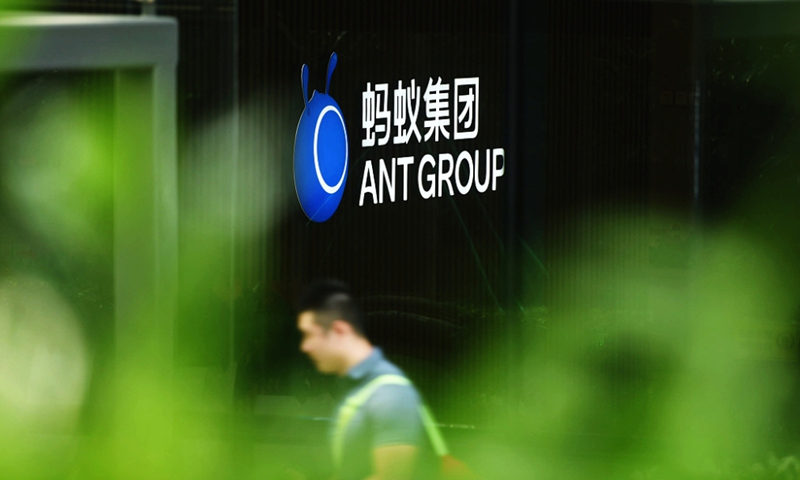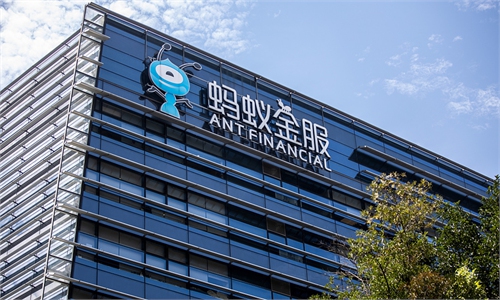SOURCE / INDUSTRIES
Regulator indicates heightening scrutiny of giant fintech platforms

Photo taken on Oct. 26, 2020 shows Ant Group logo on the buildings of Hangzhou headquarters in Hangzhou, east China's Zhejiang Province. (VCG)
China's banking and insurance regulator on Tuesday called attention to a new type of too-big-to-fail financial risk, as some technology majors like Ant Group that have extended their footprint into the financial sector stokes rising concerns over possible systemic risks.
In a speech to Singapore FinTech festival 2020, Guo Shuqing, chairman of the China Banking and Insurance Regulatory Commission (CBIRC), said that some technology firms now dominate the micropayment market which involves the public's interest and is characteristic of important financial infrastructure.
Major tech firms are now involved in various financial and tech business while also engaged in cross-sector mixed operations, according to Guo, urging attention to the complexity and spillover of risks from these institutions and proposing "targeted bomb disposal" to address their risks.
The regulator vowed to encourage innovation while keeping the bottom line firmly in place so as to address new challenges encountering the rapidly growing fintech sector.
Although no fin-tech giants were named, the remarks seem to be reminiscent of the recent IPO plight of Ant Group.
Ant Group saw its planned dual listings in Shanghai and Hong Kong come to a grinding halt on November 3 amid regulatory changes that aim to put fintech businesses on an equal footing with traditional financial institutions when it comes to capital requirements and regulation.
The push for fairer market competition is among the challenges to be dealt with, as the fintech sector is being plagued by a 'winner-take-all' mentality. Major technology firms often take advantage of their data-driven dominance to obstruct market competition and reap excessive profits, Guo said in his speech.
While traditional anti-monopoly legislation focuses on monopoly agreements, abuse of market position, concentration of business operators, among other issues, the fintech sector has given rise to many new phenomena and problems, Guo said, calling for more focus on whether big firms stand in the way of new institutions attempting to enter the market. Data protection and operating transparency were also issues cited by Guo.
In a move intended to toughen regulatory scrutiny on e-commerce marketplaces and payment services, the State Administration for Market Regulation published draft guidelines in November aimed at preventing monopolistic behavior by online payment platforms.
Describing China's fintech push as "crossing the river by feeling the stones" when it comes to regulation and risk supervision, Guo highlighted the nation's crackdown on peer-to-peer (P2P) lending.
Over the past 14 years, the cumulative number of active P2P lenders hit more than 10,000 and at its peak, the P2P sector had over 5,000 platforms operating simultaneously with annual turnover of around 3 trillion yuan ($458.86 billion), resulting in high bad loan ratios, he revealed, as of mid-November, the number of P2P platforms had fallen to zero.
Guo also disclosed that the regulators are mulling over rules for financial data protection to prevent data breach and misuse given some technology firms take advantage of market strength to excessively collect and use business and individual data and even sell data.
Global Times



